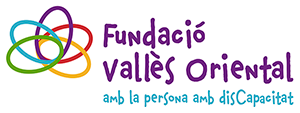Mission, vision and values
Mission
The FVO is a non-profit social organisation intended to care for people with learning difficulties in Catalonia, with the aim of promoting their quality of life and ensuring that their rights as people are respected.
Our activity is basically focused on two areas – daytime services and residential accommodation – in order to meet the different needs that arise throughout the adult life of a person with learning difficulties, while at the same time promoting social inclusion and personal autonomy.
The FVO adopts the principles of equality of opportunity and respect for people.
Vision
The FVO is a leading institution in caring for people with learning difficulties. It is deeply rooted in its immediate surroundings and has a consolidated structure in terms of personnel and finance.
The FVO has:
A solid structure managed by a committed, competent management board.
A team of professionals with broad training and experience in the field of learning difficulties.
A continuous training programme allowing it to maintain and improve the quality of its care.
Assets to ensure the objectives of its founders can be met.
The FVO’s main objective is to create the resources required to meet the different needs of people with learning difficulties, adapting or modifying these resources as the people it serves change and develop.
Values
The FVO adopts values of its own present in all its actions in the past, present and future. The Foundation represents an orderly set of ethical principles used to serve people with learning difficulties.
The FVO fully adopts commitments:
- To the welfare of people with learning difficulties
- To the quality of the services it provides
- To proper care of people with learning difficulties by the professionals working for the FVO
The ethical principles on which the FVO’s actions are based are:
- Responsibility: capacity to respond to the needs of the person cared for.
- Respect for people: considering others as people with inherent dignity.
- Discernment: capacity to decide on the best action through deliberation.
- Involvement: offering its own talent and making it available for the good of the institution.
- Commitment: accepting the consequences of its own decisions.
- Solidarity: a close relationship of reciprocal support, with the feeling of belonging to a group and awareness of common interests.
- Transparency: offering full, accessible information.


